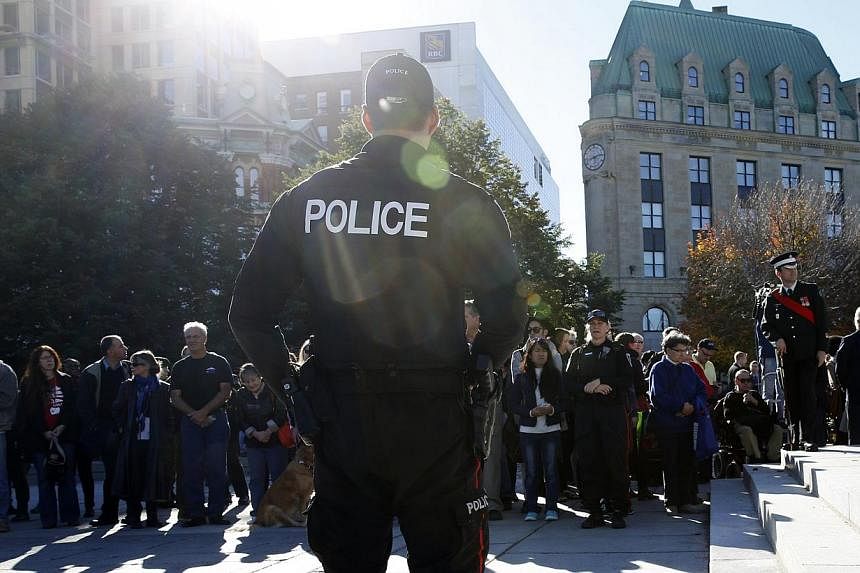OTTAWA (AFP) - In the aftermath of two deadly attacks on Canadian soil this week and amid growing concerns over the radicalization of local youths, Ottawa is quickly moving to bolster its surveillance capabilities.
The new laws would give authorities more powers to track terror suspects abroad and detain persons at home suspected of plotting attacks.
The attacks on soldiers outside Montreal on Monday and in Ottawa on Wednesday came just days after Public Safety Minister Steven Blaney announced draft legislation to give new powers to Canada's spy agency.
The legislation was to be unveiled in parliament on Wednesday, when a gunman fatally shot a soldier at Ottawa's war memorial before storming the halls of parliament, where he himself was shot dead.
The proposed amendment to the 1984 Canadian Security Intelligence Service (CSIS) Act will be "unveiled soon," Mr Blaney's spokesman told AFP.
"Our laws and police powers need to be strengthened in the area of surveillance, detention, and arrest," Prime Minister Stephen Harper told lawmakers on Thursday.
"They need to be much strengthened," he said. "I assure members that work which is already under way will be expedited."
Ottawa has said it is aware of at least 130 Canadians overseas who are "suspected of terrorism-related activities."
As well, authorities are monitoring about 90 others who have recently returned from war zones, notably in Iraq and Syria, and are suspected of having links to foreign fighters.
Mr Martin Couture-Rouleau - the driver who ran over two soldiers on Monday in a Quebec parking lot, killing one of them - had his passport seized while trying to board a plane to Turkey.
Police feared he was attempting to join the Islamic State group.
Mr Michael Zehaf-Bibeau, the Ottawa attacker, had applied for a passport with the intent to travel to Syria, according to police.
Once suspects leave the country, Mr Blaney said, the existing legal framework makes it difficult for the CSIS to aggressively pursue them.
This was highlighted in recent court rulings that invited clarification of the spy agency's rules of engagement.
A federal court slammed CSIS for using its partners in the "Five Eyes" spy network - Australia, Britain, New Zealand and the United States - to skirt laws requiring a warrant to monitor Canadians overseas, saying it put citizens at risk of being detained on foreign soil.
"The law clearly forbids collecting information, even in a roundabout way, on Canadians without a court order," former CSIS agent Michel Juneau-Katsuya told AFP.
The former spy said he supports the government's proposed reforms, saying "it is absolutely necessary to be able to glean intelligence obtained by our allies."
In contrast to security laws pushed through in the wake of the September 11, 2001 attacks in the United States to detain and deport foreign nationals living in Canada suspected of ties to Al-Qaeda, this new round of legislative tweaks is focused on homegrown threats.
"We're facing a new kind of terrorism today: Canadian-born lone wolves inspired by the Islamic State group (or other extremist groups) but acting independently in launching very unsophisticated attacks that cause widespread panic and terror," said Mr Juneau-Katsuya.
Civil rights groups warned against the creation of a police state while lawmakers, even while the attack in Ottawa was ongoing, lamented the possible fortification of parliament in its wake.
Canada has one of the most open legislatures in the world. Fleeing from the firefight between security officials and Mr Zehaf-Bibeau, lawmaker John MacKay stopped outside, still shaking, to tell AFP, "This will change a lot of things... but hopefully not Canadians' cherished access to their lawmakers."
For Mr Juneau-Katsuya, "the events of this week demonstrated that terrorism linked to the Islamic State group is of a type that can explode anywhere at any time."
The challenge for Mr Harper's Conservative government will be to find the right balance between safeguarding citizens and their liberties, he added.

